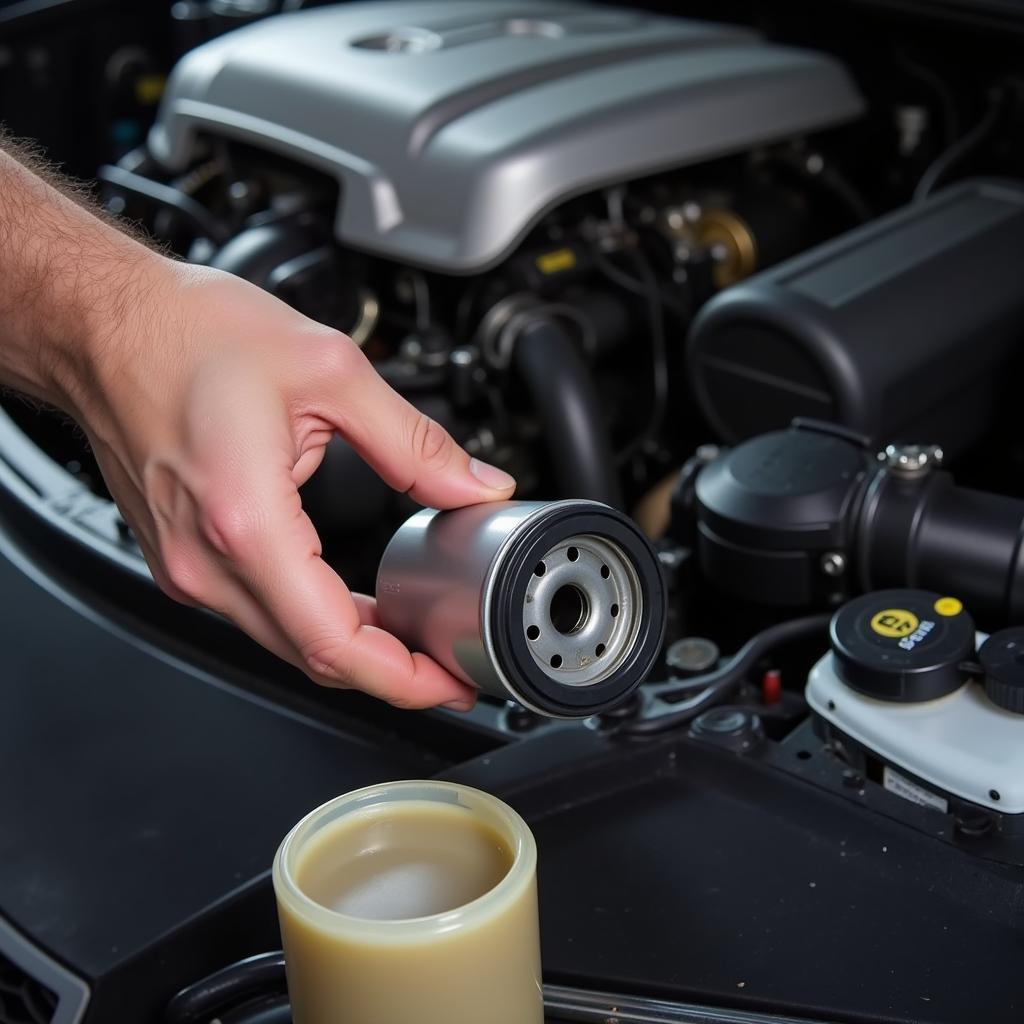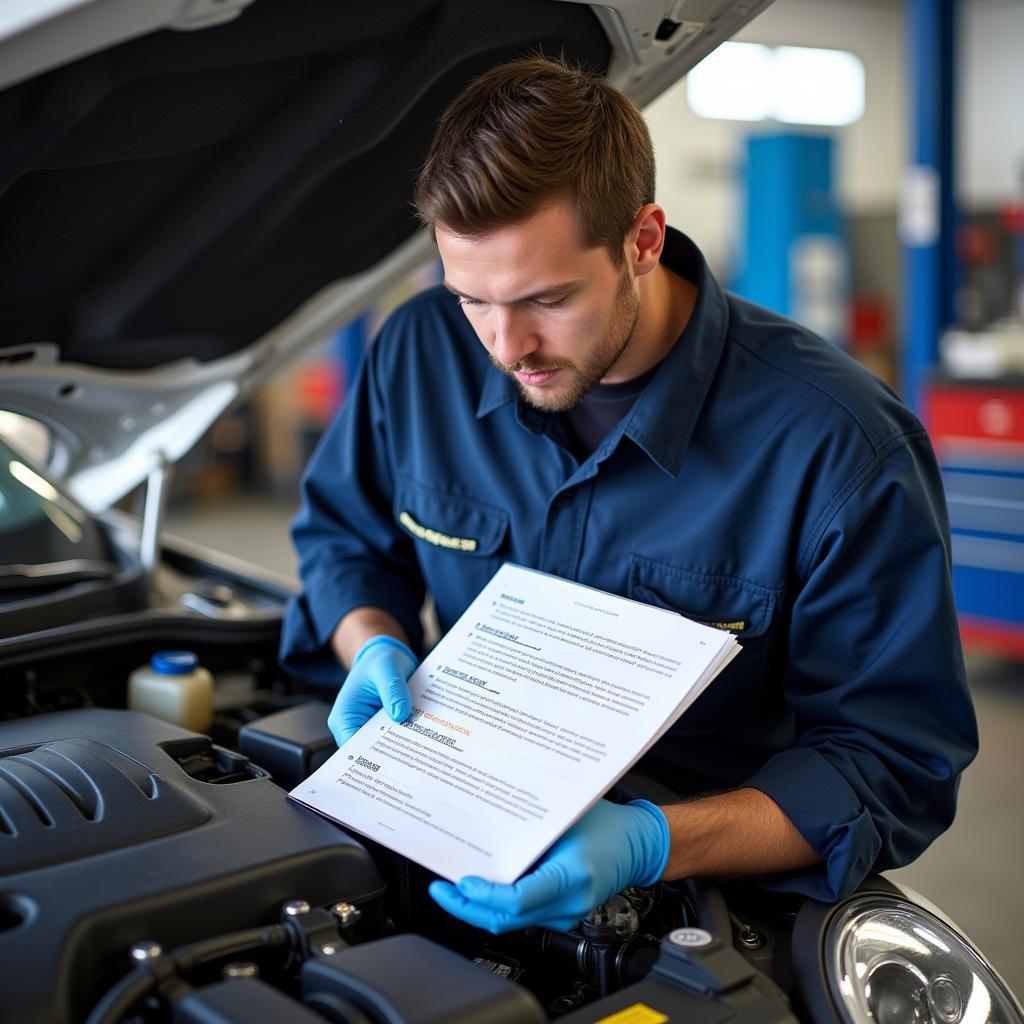What Parts Do You Need for a Full Car Service?
Ensuring your car receives regular maintenance is crucial for its longevity, performance, and your safety on the road. But What Parts Do You Need For A Full Car Service? Understanding the essential components and their role in keeping your vehicle in top shape can save you time, money, and potential headaches down the road.
Decoding “Full Car Service”: What Does It Entail?
The term “full car service” can seem vague, and its definition may vary slightly between mechanics. Generally, it encompasses a comprehensive inspection and maintenance of your car’s vital systems. This includes checking fluid levels, replacing worn-out parts, and ensuring everything runs smoothly. Think of it as giving your car a thorough health check-up!
The Essential Parts Checklist for a Full Car Service
While the specific parts needed may differ depending on your car’s make, model, age, and mileage, here’s a rundown of the usual suspects:
1. Engine Oil and Oil Filter
 Engine Oil and Filter Change
Engine Oil and Filter Change
Often considered the lifeblood of your car, engine oil lubricates moving parts, reduces friction, and prevents overheating. The oil filter traps contaminants, ensuring clean oil circulates through the engine. These two are typically replaced together during a full service.
2. Air Filter
Just like our lungs, your car’s engine needs to breathe. The air filter prevents dust, dirt, and debris from entering the engine, ensuring optimal combustion and fuel efficiency.
3. Spark Plugs
These small but mighty components ignite the air-fuel mixture in the engine cylinders, generating the power to move your car. Worn-out spark plugs can lead to misfires, reduced fuel economy, and difficulty starting.
4. Fuel Filter
Fuel, like any other fluid, can contain impurities. The fuel filter prevents these contaminants from reaching the engine, ensuring smooth performance and protecting sensitive fuel injectors.
5. Cabin Air Filter
While not directly related to your car’s performance, the cabin air filter is essential for your health and comfort. It filters out dust, pollen, and other allergens from the air entering your car’s cabin, providing you with clean and fresh air to breathe.
6. Other Fluids
Besides engine oil, a full car service also includes checking and topping up other essential fluids, such as:
- Coolant: Regulates engine temperature.
- Brake fluid: Transmits force from the brake pedal to the wheels.
- Power steering fluid: Assists in effortless steering.
- Transmission fluid: Lubricates the transmission system.
- Windshield washer fluid: Keeps your windshield clear.
7. Belts and Hoses
A full service also includes inspecting the condition of various belts and hoses under the hood. These components are vital for the functioning of your car’s engine and other systems, and worn-out belts or hoses can lead to significant problems if left unchecked.
Beyond the Basics: Additional Checks and Replacements
In addition to the parts mentioned above, a full car service often encompasses a comprehensive inspection of your car’s:
- Brakes: Checking brake pads, discs, and lines for wear and tear.
- Suspension: Inspecting shocks, struts, and other components for proper functioning.
- Tires: Checking tire pressure, tread depth, and overall condition.
- Lights: Ensuring all exterior lights are working correctly.
- Battery: Testing battery health and charging system.
“A well-maintained car is a safe car,” says John Smith, a veteran mechanic with over 20 years of experience. “Regular servicing not only ensures your car runs smoothly but also helps identify potential problems before they escalate into major issues.”
The Importance of Regular Car Servicing
While knowing what parts are needed for a full car service is essential, understanding the significance of regular maintenance is equally crucial. Just like visiting a doctor for regular check-ups, bringing your car in for service at recommended intervals ensures its longevity, performance, and your safety on the road.
Remember, prevention is always better than cure. Regular car servicing can save you from costly repairs down the line and keep your car running smoothly for years to come.
Frequently Asked Questions (FAQs)
1. How often should I get a full car service?
It’s best to consult your car’s owner’s manual for specific recommendations. However, a general rule of thumb is to have a full service at least once a year or every 12,000 miles, whichever comes first.
2. How much does a full car service cost?
The cost can vary significantly depending on your car’s make and model, the mechanic you choose, and your location. It’s always a good idea to get quotes from different service centers before making a decision.
3. Can I perform a full car service myself?
While some routine maintenance tasks can be performed at home, a full car service is best left to qualified mechanics with the necessary expertise and equipment.
4. What should I look for when choosing a car service center?
Look for certified mechanics, positive customer reviews, and transparent pricing. It’s also a good idea to choose a service center specializing in your car’s make and model.
5. How can I extend the lifespan of my car parts?
Following your car manufacturer’s recommended service intervals, using high-quality parts, and adopting smooth driving habits can significantly extend the lifespan of your car parts.
For more information about car maintenance and services, check out our articles on what is public service health care plan and what jobs are in the human services career cluster.
Need Assistance with Your Car Service?
If you require expert help with your car’s maintenance, don’t hesitate to contact us! Our team of professional mechanics at CarServiceOnline is dedicated to keeping your car in top condition. Reach out to us via WhatsApp at +1(641)206-8880 or email us at [email protected]. Our customer support team is available 24/7 to assist you.

